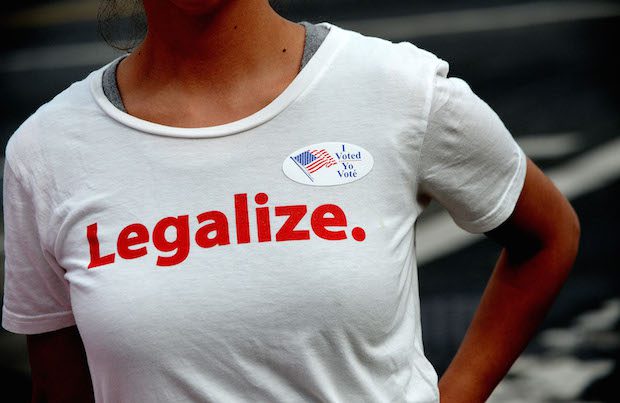The Conservative Case for Pot Legalization in D.C.

Republicans just won a national election campaigning against the idea that the federal government knows more about your health than you do. So will the party of federalism, local control and limited government overturn marijuana legalization in Washington, D.C.?
Granted, it wouldn’t be a case of faraway bureaucrats from the nation’s capital meddling in some Middle American town and the concept of “state’s rights” doesn’t apply here. This is the federal district in which Congress operates. Nevertheless, the legalization initiative passed with 69 percent of the vote. Reversing it would be a bit incongruous. It would also play into the stereotype that Republicans only care about local control for communities that look a certain way.
This doesn’t seem to bother Maryland Republican Rep. Andy Harris, however. Harris told the Washington Post he would “consider using all resources available to a member of Congress to stop this action.” The health of America’s teens is at stake, he says.
What’s been remarkable is that few Republicans have rushed to join Harris—at least so far. You would expect California Republican Rep. Dana Rohrabacher, who sponsored an amendment to keep the federal government from undermining state medical marijuana laws, and of course Rand Paul to defend the District of Columbia. And they both have. But prohibitionist Republicans haven’t been especially vocal.
That’s not to say most Republicans don’t still have major misgivings about legalizing drugs, even marijuana. Legalization in the nation’s capital has to be especially galling to them and the GOP congressional majority has the legal tools to stop it. Once the initiative is submitted for congressional review, federal lawmakers have thirty legislative days to pass a resolution blocking it. Congress can also defund its implementation—and this defunding initiative probably wouldn’t shut down the federal government.
But Congress would have to move quickly on a resolution of disapproval, making it one of the new majority’s earliest priorities. They would probably have nothing to show for it in the end, as President Obama has suggested his signature won’t be forthcoming. Even the frequently PR-challenged Republicans can likely sense this would be bad symbolically.
Where opponents could do the most damage is attaching riders defunding legalization’s implementation to must-sign appropriations bills. While it’s probably too late to stop legalization’s initial rollout, putting together the necessary tax and regulatory regime will take a couple of years. That’s plenty of time to gum up the works.
But this would be a step backward. Congress interfered with medical marijuana in D.C.—also approved by 69 percent of voters—for more than a decade, thanks to an amendment by Republican (and future Libertarian Party presidential candidate) Bob Barr. A Democratic majority finally relented in 2009. A Democratic Senate kept Harris from using the appropriations process to block decriminalization of marijuana for Washington adults last year.
Even if you disagree with the substantive policy—and an argument could be made that Washington, D.C. moved to full legalization too quickly before the results of decriminalization could be assessed—this is the most conservative way to experiment with alternatives to the war on drugs. Any risks are confined to states and localities. These jurisdictions are starting with marijuana, certainly not a harmless substance but one much less controversial than cocaine or heroin. It’s also a drug experience has taught us has many high-functioning casual users.
It’s the type of gradual experimentation Republicans would be the first to promote with social welfare programs. Why not a national drug policy that is manifestly failing?
Allowing D.C.’s vote to stand doesn’t even require endorsing legalization itself. Senator Paul provided the template. “I really haven’t taken a stand on … the actual legalization,” he said. “I haven’t really taken a stand on that, but I’m against the federal government telling them they can’t.”
It’s possible Paul will wind up chairing the Senate subcommittee with jurisdiction over D.C. But he shouldn’t have to for Republicans to do the right thing.
W. James Antle III is editor of the Daily Caller News Foundation and author of Devouring Freedom: Can Big Government Ever Be Stopped?
Comments